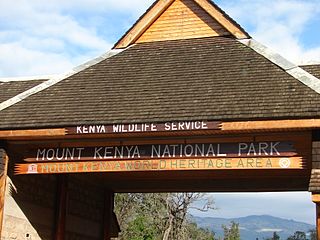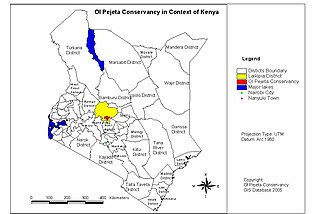
Poaching is the illegal hunting or capturing of wild animals, usually associated with land use rights. Poaching was once performed by impoverished peasants for subsistence purposes and to supplement meager diets. It was set against the hunting privileges of nobility and territorial rulers.
Saba Iassa Douglas-Hamilton is a Kenyan wildlife conservationist and television presenter. She has worked for a variety of conservation charities, and has appeared in wildlife documentaries produced by the BBC and other broadcasters. She is currently the manager of Elephant Watch Camp in Kenya’s Samburu National Reserve and Special Projects Director for the charity Save the Elephants.

The International Fund for Animal Welfare (IFAW) is one of the largest animal welfare and conservation charities in the world. The organization works to rescue individual animals, safeguard populations, preserve habitat, and advocate for greater protections. Brian Davies founded IFAW. IFAW was instrumental in ending the commercial seal hunt in Canada. In 1983 Europe banned all whitecoat harp seals products. This ban helped save over 1 million seals. IFAW operates in over 40 countries.

Environmental issues in Kenya include deforestation, soil erosion, desertification, water shortage and degraded water quality, flooding, poaching, and domestic and industrial pollution.

Frank Pope is the chief executive officer for Save the Elephants (STE). After studying zoology at the University of Edinburgh he began his career in marine science before joining The Times newspaper as the world's only Ocean Correspondent to cover the fast-changing science, environment and geopolitics of the sea and help increase visibility of the crisis facing marine ecosystems. During this time he published two books, Dragon Sea and 72 Hours and hosted the BBC Series Britain's Secret Seas.

Kenya Wildlife Service (KWS) is a state corporation under the Ministry of Tourism and Wildlife established by an act of Parliament; Wildlife Conservation and Management Act CAP 376, of 1989, now repealed and replaced by the Wildlife Conservation and Management Act, 2013. At independence, the Government of Kenya committed itself to conserving wildlife for posterity with all the means at its disposal, including the places animals lived, forests and water catchment areas.

Dr. Iain Douglas-HamiltonCBE is a Scottish zoologist from Oxford University and one of the world's foremost authorities on the African elephant. Douglas-Hamilton pioneered the first in-depth scientific study of elephant social behaviour in Tanzania's Lake Manyara National Park, aged 23. His work in the 1960s paved the way for much of today’s understanding of elephants and current conservation practices. During the 1970s he investigated the status of elephants throughout Africa and was the first to alert the world to the ivory poaching holocaust, bringing about the first global ivory trade ban in 1989. In 1993, Douglas-Hamilton founded Save the Elephants, which is dedicated to securing a future for elephants and their habitats. For his work on elephants he was awarded two of conservation's highest awards - the Order of the Golden Ark in 1988, the Order of the British Empire in 1992, and the Commander of the British Empire (CBE) in 2015. In 2010, he was named the recipient of the Indianapolis Prize, the world's leading award for animal conservation. In May 2012, Douglas-Hamilton spoke at the Senate Foreign Relations Committee hearing on Ivory and Insecurity: The Global Implications of Poaching in Africa.

Human–wildlife conflict (HWC) refers to the negative interactions between humans and wild animals, with undesirable consequences both for people and their resources on the one hand, and wildlife and their habitats on the other. HWC, caused by competition for natural resources between human and wildlife, influences human food security and the well-being of both humans and other animals. In many regions, the number of these conflicts has increased in recent decades as a result of human population growth and the transformation of land use.
Esmond Bradley Martin was an American conservationist who fought for both the preservation of elephants against the illegal ivory trade, and for the rhinoceros against the illegal trade of rhinoceros horns. A trained geographer, Martin was considered a world-renowned expert in the ivory trade and rhinoceros horn trade. He had been a special envoy of the United Nations for the conservation of rhinoceros. Militant for a reduction in the demand for ivory to dry up the market, he participated notably in the stop of rhinoceros horn trade to China in 1993 and ivory in 2017.

The International Elephant Foundation (IEF) is a non-profit 501(c)(3) corporation. Formed by individuals and institutions, IEF is dedicated to the conservation of African and Asian elephants worldwide.
The Wildlife Conservation Network (WCN) is a United States-based 501(c)(3) non-profit organization that protects endangered wildlife by supporting conservationists in the field who promote coexistence between wildlife and people. WCN does this by providing its partners with capital, strategic capacity-building services, training, and operational support. WCN has been given a top rating amongst wildlife conservation charities, with a four star rating on Charity Navigator.
The African Wildlife Foundation (AWF) is an international conservation organization dedicated to the preservation of Africa's wildlife and wild lands. AWF aims to protect the continent's wild lands as well as its wildlife and natural resources.

The Sheldrick Wildlife Trust (SWT) operates an orphan elephant rescue and wildlife rehabilitation program in Kenya. It was founded in 1977 by Dame Daphne Sheldrick to honor her late husband, David Sheldrick. Since 2001, it has been run by their daughter, Angela Sheldrick.

The Ol Pejeta Conservancy is a 360 km2 (140 sq mi) not-for-profit wildlife conservancy in Central Kenya's Laikipia County. It is situated on the equator west of Nanyuki, between the foothills of the Aberdares and Mount Kenya. The Ol Pejeta Conservancy works to conserve wildlife, provide a sanctuary for great apes, and generate income through wildlife tourism and complementary enterprises for re-investment in conservation and community development.
Jim Justus Nyamu, of Nairobi, Kenya, is an elephant research scientist and activist against poaching and trade in ivory. Nyamu is the executive director at the Elephant Neighbors Center (ENC) and is leader of the movement, Ivory Belongs to Elephants. He has also held positions at the African Conservation Centre and Kenya Wildlife Service. The ENC is a grass-roots collaborative and participatory research organization focused on enhancing the capacity of communities living with wildlife to promote interlinkages between species and their habitats.

World Elephant Day is an international annual event on August 12, dedicated to the preservation and protection of the world's elephants. Conceived in 2011 by Canadian filmmakers Patricia Sims and Michael Clark of Canazwest Pictures, and Sivaporn Dardarananda, Secretary-General of the Elephant Reintroduction Foundation in Thailand, it was officially founded, supported and launched by Patricia Sims and the Elephant Reintroduction Foundation on August 12, 2012. Since that time, Patricia Sims continues to lead, support and direct World Elephant Day, which is now recognized and celebrated by over 100 wildlife organizations and many individuals in countries across the globe.
Joyce Hatheway Poole is a biologist, ethologist, conservationist, and co-founder/scientific director of ElephantVoices. She is a world authority on elephant reproductive, communicative, and cognitive behavior.

Paula Kahumbu is a wildlife conservationist and chief executive officer of WildlifeDirect. She is best known as a campaigner for elephants and wildlife, spearheading the Hands Off Our Elephants Campaign, which was launched in 2014 with Kenyan First Lady Margaret Kenyatta. She has recently in 2022 been appointed as the first National Geographical Explorer as a board of Trustees member at the National Geographic Society.
The Big Life Foundation is a non-profit conservation organization focused on preserving the wildlife and habitats of the Amboseli-Tsavo-Kilimanjaro ecosystem of East Africa through community-based and collaborative strategies.
Resson Kantai Duff is Kenyan conservationist and the deputy director at Ewaso Lions.












